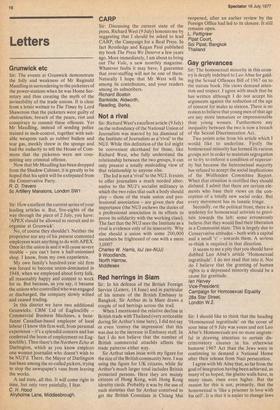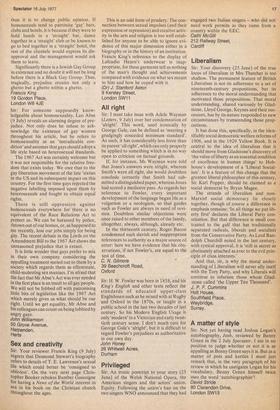Gay grievances
Sir: The homosexual minority in this country is deeply indebted to Leo Abse for guiding the Sexual Offences Bill of 1967 on to the statute book. His yiews demand attention and respect. I agree with much that he has written although I do not accept his arguments against the reduction of the age of consent for males to sixteen. There is no reason to believe that young men of that age are any more immature or impressionable than young women. Furthermore any inequality between the two is now a breach of the Sexual Discrimination Act.
Two points arise from his article which I would like to underline. Firstly the homosexual minority has formed its various groups not in order to maintain segregation or to try to enforce a condition of superiority but because the heterosexual majority has refused to accept the social implications of the Wolfenden Committee Report. When that situation is rectified they should disband. I admit that there are certain elements who base their views on the conception of a totally new social order, But every movement has its lunatic fringe.
Secondly, on the political front, there is a tendency for homosexual activists to gravitate towards the left: some erroneously believe that they would find their liberation in a Communist state. This is largely due to Conservative attitudes — both with a capital and a small 'c' — towards them. A serious re-think is required in that direction.
It seems to me a pity that you should have dubbed Leo Abse's article 'Homosexual ingratitude'. I do not read that into it. Nor do I believe that the granting of human rights to a depressed minority should be a cause for gratitude.
Ian Harvey Vice-President; Campaign for Homosexual Equality 28a Star Street, London W.2.
Sir: I should like to think that the heading 'Homosexual ingratitude' on the cover of your issue of 9 July was.yours and not Leo Abse's. Homosexuals are no more ungrateful in drawing attention to certain discriminatory clauses in his otherwise humane 1967 Act than the Jews were in continuing to demand a National Home after their release from Nazi persecution.
I agree with Mr Abse that, so far from the goal of integration having been achieved, as many of us hoped, the ghetto walls have, in many cases, risen even higher. But the reason for this is not, primarily, that the homosexual is 'like a prisoner in love with his cell'. It is that it is easier to change laws than it is to change public opinion. If homosexuals tend to patrdnise 'gay' bars, clubs and hotels, it is because if they were to hold hands in a 'straight' bar, dance together in a 'straight' club or be known to go to bed together in a 'straight' hotel, the rest of the clientele would express its disapproval and the management would ask them to leave.
Significantly there is a Jewish Gay Group in existence and no doubt it will not be long before there is a Black Gay Group. Thus, tragically, prejudice creates not only a ghetto but a ghetto within a ghetto. Francis King 19 Gordon Place, London W8 4JE Sir: For someone supposedly knowledgeable about homosexuality, Leo Abse (9 July) reveals an alarming degree of prejudice. Not only does he refuse to acknowledge the existence of gay women throughout his article, but he refers to homosexuality aS an 'ineradicable condition' and assumes that gays should adopt a life style based on heterosexual Standards.
The 1967 Act was certainly welcome but it was not responsible for the relative freedom that exists today. We owe that to the gay liberation movement of the late 'sixties in the US and its subsequent impact on this country. For the first time gays rejected the negative labelling imposed upon them by heterosexuals ancl fought to obtain equal
rights. • There is still oppression against homosexuals everywhere for there is no equivalent of the Race Relations Act to protect us. We can be harassed by police, thrown out of our homes, or, as happened to me recently, lose our jobs simply for being gay. The recent debate in the Lords on the Amendment Bill to the'1967 Act shows the unreasoned prejudice that is extant.
It is little wonder that gays prefer to mix in their own company considering the appalling treatment meted out to them by a society which regards them as effeminate, child-molesting sex maniacs. I'm afraid that the fact that Mr Abse's Act was ever needed in the first place is an insult to all gay people. We will not be fobbed off with patronising little bits of legislation like the 1967 Act which merely gives us what should be our right. Until we get equality, Mr Abse and his colleagues can count on being lobbied by angry gays. John Williamson 50 Grove Avenue, Harpenden, Hens



































 Previous page
Previous page